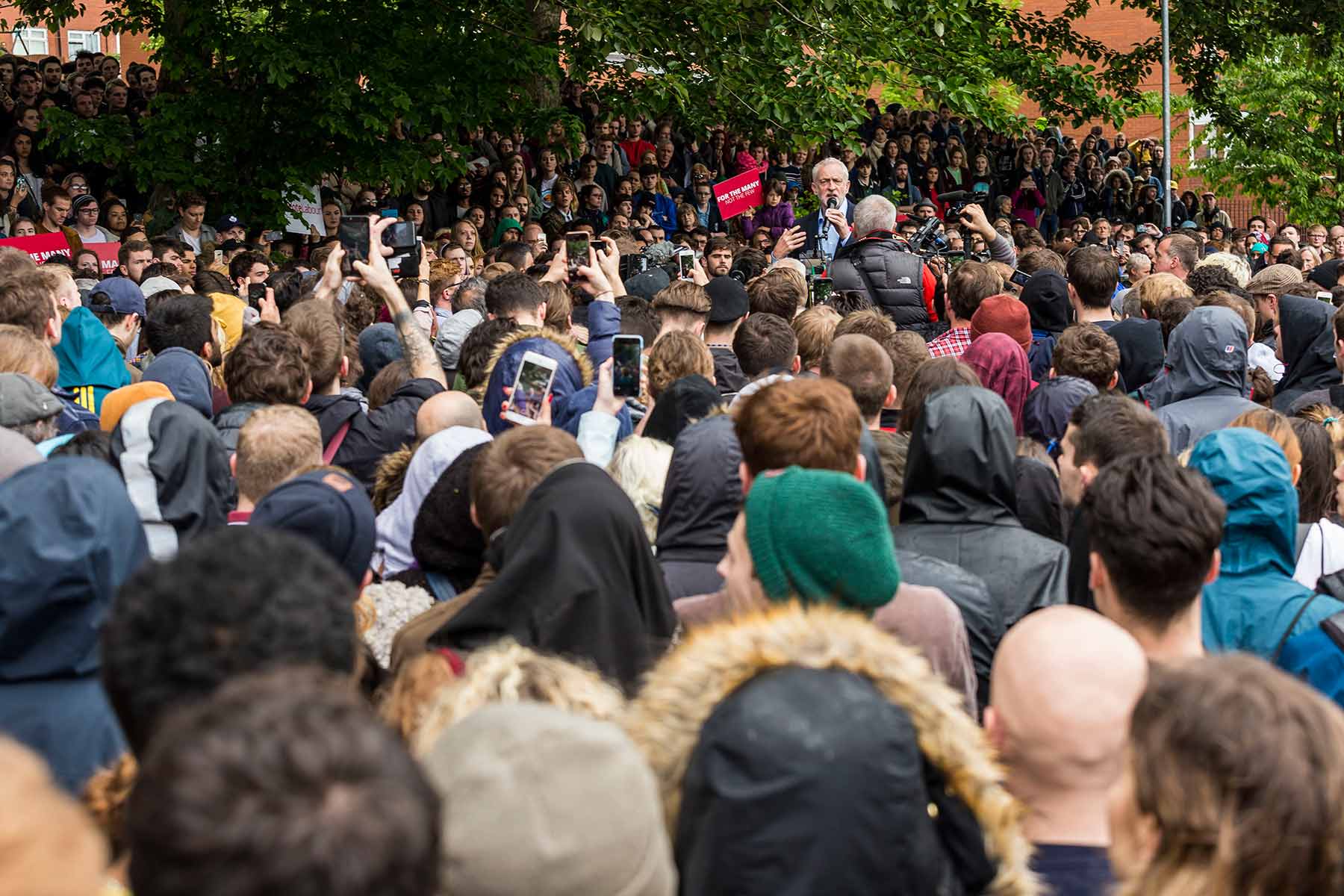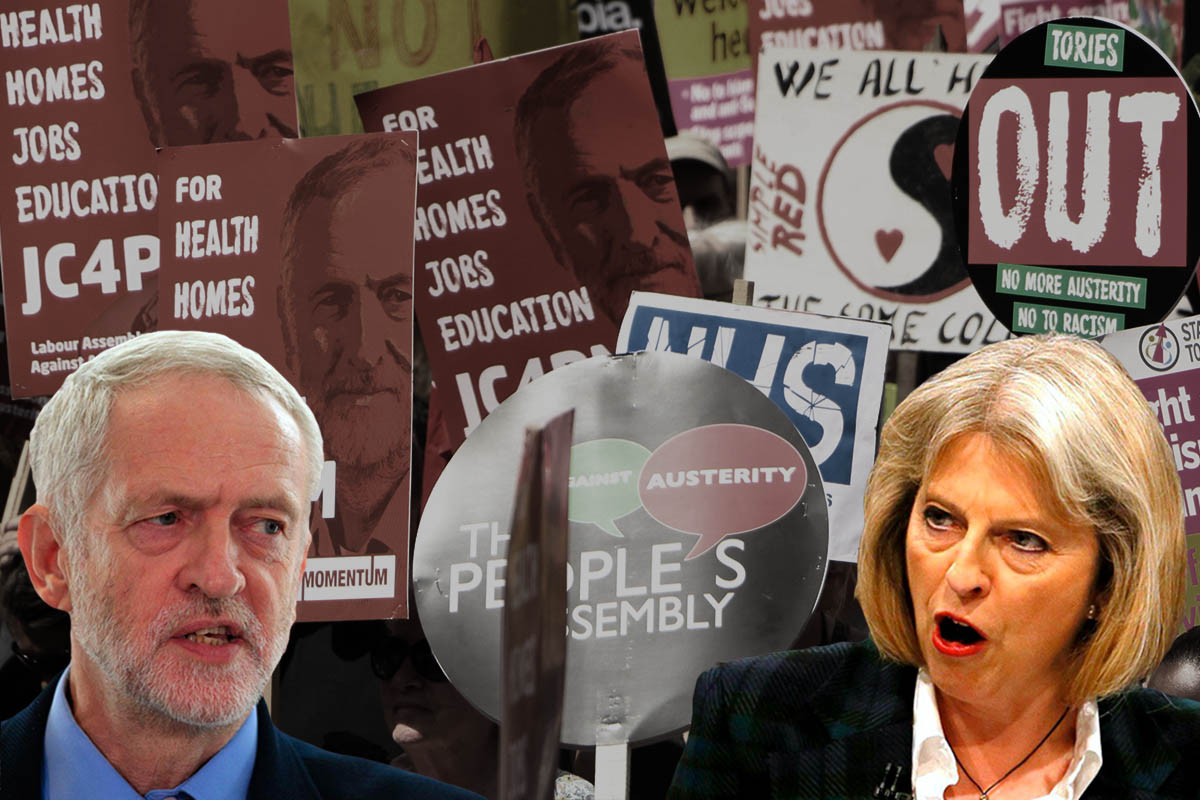A study into Britain’s major political parties has confirmed what most will already know: the Tories are an aging party in decline; Corbyn’s Labour, a party driven by the dynamism of the youth.
Earlier this year 2018, a government-funded body published an in-depth report on political party membership and the views and attitudes of party members from the four main UK political parties: Labour, Conservatives, SNP and Liberal Democrats.
The survey had some fairly damning news for the Conservatives, whose declining and aging membership demonstrates that the party really is only a representative of the past. But the past that the Tory Party’s base yearns for a return to is an empire that has long gone; as Jeremy Corbyn put it, to a time when Britain ruled the waves and waived the rules!
Blast from the past
 The attitudes of the Tory membership, the research indicates, are exactly what you’d expect from a party that represents the worst parts of a failing capitalist system. 84% of Tory members thought that schools should teach children to “obey authority”, and over 70% thought that criminals should receive “tougher sentences”.
The attitudes of the Tory membership, the research indicates, are exactly what you’d expect from a party that represents the worst parts of a failing capitalist system. 84% of Tory members thought that schools should teach children to “obey authority”, and over 70% thought that criminals should receive “tougher sentences”.
Over 75% of Conservative Party members thought that young people don’t have enough respect for “traditional British values” – a sinister phrase that we’ve been hearing more and more of recently. And over half of all Tory members agreed with capital punishment, while less than half agreed with same-sex marriage.
These results aren’t that surprising when you look at the rise of figures such as Jacob Rees-Mogg and Boris Johnson in the party, who consistently pander to the disgusting rhetoric of UKIP and other similarly politically backward layers. Cameron’s calling of the Brexit referendum, after all, was itself an attempt to satisfy these elements inside the Tory party.
With the system they defend in crisis, the Tories clearly have nothing positive to offer ordinary people. The party and its media mouthpieces, therefore, are forced to rely more and more on whipping up jingoistic nationalism, racism, and bigotry.
The Tories have been looking to the most reactionary sections of society for any support they can find. But even here they are struggling.
In an interview earlier this year, a former Conservative campaign manager spoke about the party’s struggle to break into the world of social media – the sole focus of their campaigning strategy. The party official stated that:
“It’s amazing what a response Tommy Robinson and Britain First get on Facebook, how they engage people. Every now and then you see that one of your Facebook friends has shared one of their videos, and you’re like – wow, they’ve got 25,000 likes.”
This adoration towards the far right from top Tories neatly summarises which layers are driving the Conservative Party and its policies today. This is of great concern for the ruling class, who are increasingly losing control of their traditional (and formerly reliable) political representatives.
Polarisation and radicalisation
 This shift further to the right by the Tories demonstrates the polarisation taking place within the political landscape. This process can also be seen in the results of the party membership report, which shows a sharp divide between the views of Labour and SNP members on one side, who share quite similar views on most issues, and the views of Conservative party members on the other.
This shift further to the right by the Tories demonstrates the polarisation taking place within the political landscape. This process can also be seen in the results of the party membership report, which shows a sharp divide between the views of Labour and SNP members on one side, who share quite similar views on most issues, and the views of Conservative party members on the other.
While 94% of Labour members agreed that the government should redistribute income from the better off to the less well off, only 15% of Tory members agreed. SNP members polled well over 89% on this question too.
Similarly, on the question of whether big businesses take advantage of ordinary people, 96% of Labour members agreed, compared to just 32% of Tory members. And on the question of whether ordinary people get their fair share of the nation’s wealth, 97% of Labour members and 95% of SNP members said no, compared to 19% of Tories.
Indeed, the close opinions of Labour and the SNP’s grassroots (although not necessarily the SNP leadership and certainly not the Blairites in Westminster) does show how both these parties have been transformed by workers and youth, who have become radicalised by events.
This radical mood can be seen from the significant anti-establishment statements presented by this survey – a mood that is increasingly being reflected inside the Labour Party at all levels. Meanwhile, most Tories support the rich keeping all the money, exploiting workers, and maintaining poverty.
Which side are you on?
 Jeremy Corbyn’s Labour Party dealt a damaging blow to the Conservatives in the snap election last year, presenting a clear political alternative to the current Tory government. The Labour Manifesto gathered a huge amount of support from the working class and amongst the youth. Over 60% of those aged 18-30 voted Labour, compared to just over 20% in the same age bracket for the Tories.
Jeremy Corbyn’s Labour Party dealt a damaging blow to the Conservatives in the snap election last year, presenting a clear political alternative to the current Tory government. The Labour Manifesto gathered a huge amount of support from the working class and amongst the youth. Over 60% of those aged 18-30 voted Labour, compared to just over 20% in the same age bracket for the Tories.
The Labour Party now boasts a membership of over five times that of the Conservatives. All this, despite an endless media onslaught of slander against Corbyn and those who support him. And this is not to mention the consistent back-stabbing of the Blairites in the Parliamentary Labour Party, who would rather destroy the party than see Corbyn in Downing Street.
These right-wing Labour MPs are agents of big business; their hysteria reflects the fears of the capitalists about the prospect of a left-wing Labour government.
In this period of capitalist decline and political polarisation when the class struggle is at its most sharp, the battle lines are drawn clearly in the sand. The question is increasingly being posed as one of: Corbyn vs. the establishment – which side are you on?
For the vast majority of those entering into political activity, the answer obvious. This explains the huge difference in membership numbers between the two main parties. The Tories increasingly represent only a tiny fraction of society.
All that is solid…
 As the crisis of capitalism exposes the class divide in society even further, the rise of rabid right-wing ideology within the traditional party of the ruling class should come as no surprise. Indeed, this survey of Britain’s political parties will likely only confirm things that were already obvious to most observers.
As the crisis of capitalism exposes the class divide in society even further, the rise of rabid right-wing ideology within the traditional party of the ruling class should come as no surprise. Indeed, this survey of Britain’s political parties will likely only confirm things that were already obvious to most observers.
Above all, however, this report demonstrates which side all the living, dynamic, and progressive forces in society are on. The majority of society – and in particular the younger generation – are fed up with the establishment and their broken status quo. Workers and youth are ready for a real political change.
Theresa May and her degenerate party know full well that the support they stand on is like a melting block of ice. It is only a matter of time before they are washed away into the drain hole of history, where they belong.






